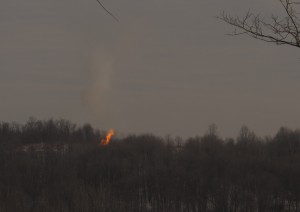Pa. faults Chevron for lack of oversight, poor communication in fatal well fire
-
Katie Colaneri

Katie Colaneri/ StateImpact Pennsylvania
State investigators have determined that human error may have led to a fatal explosion on a well pad in Dunkard Township, Greene County in February.
In a new report out today, the Department of Environmental Protection says Chevron was “too guarded” in its communication with state regulators and the media, and did not provide adequate information after a fatal well fire in southwest Pennsylvania.
The DEP admits it is also to blame for the poor communication and that the agency did not immediately assert its authority following the incident in February.
A second report by the department’s Bureau of Investigations faults Chevron’s site managers for inadequate supervision over several contractors working on the Lanco A well pad in Dunkard Township, Greene County.
DEP investigators found the explosion was likely caused by an inexperienced contractor – known as a “greenhat” – who was sent to assist a more experienced worker in preparing to put the three wells on the pad into production. The agency determined the unnamed greenhat did not properly tighten a bolt and locknut assembly on one of the wellheads, allowing gas to escape and eventually ignite.
“Our investigation revealed that the oversight of that operation was somewhat less than it should have been,” said DEP spokesman John Poister.
A contract worker, 27-year-old Ian McKee, was killed in the fire on Feb. 11.
Chevron failed to “provide meaningful update information”
As StateImpact Pennsylvania has reported, Chevron blocked DEP personnel from accessing the site for nearly two days after the explosion.
In its after-action review, the DEP says Chevron restricted access to state officials “based on what they believed were [Pennsylvania State Police] directives.” About two hours after the explosion, state police established a half-mile perimeter around the site.
The company also “failed to continually provide meaningful update information” during briefings at a command center set up by the company on a neighboring well pad.
DEP staff were “excluded from discussions” with Chevron and Wild Well Control – the specially-trained group called in from Texas to fight the fire – “while they developed the information provided at the regularly scheduled briefing.”
The report found members of the press were also not properly informed.
The company set up an information center at the Bobtown Polish Club, a small bar and event hall just over a mile from the well pad. However, Chevron personnel staffing the center were not authorized to speak to reporters. Media communications were handled by DEP officials and local lawmakers who were not receiving detailed reports from Chevron.
“That kind of response should never ever happen again.”
The department is developing a new protocol for emergencies to establish the agency’s authority on the site of the incident, and ensure that the department and the public are better informed.
Poister said the DEP is sending a message to Chevron and other operators.
“We’re going to make that clear to the industry,” he said. “That kind of response should never ever happen again.”
In March, the department cited Chevron for nine violations related to the incident. DEP officials plan to meet with the company to discuss the reports and the violations before issuing fines.
The federal Occupational Safety and Health Administration is conducting its own investigation.
“Chevron is committed to safe operations,” said spokeswoman Lee Ann Wainwright. “We look forward to continuing to work with the Pennsylvania DEP and OSHA in order to fully understand what happened with this incident, and we are determined to prevent it from happening again.”
Last month, the parents of the worker killed in the explosion filed suit against Chevron.
You can read the two DEP reports here:
















